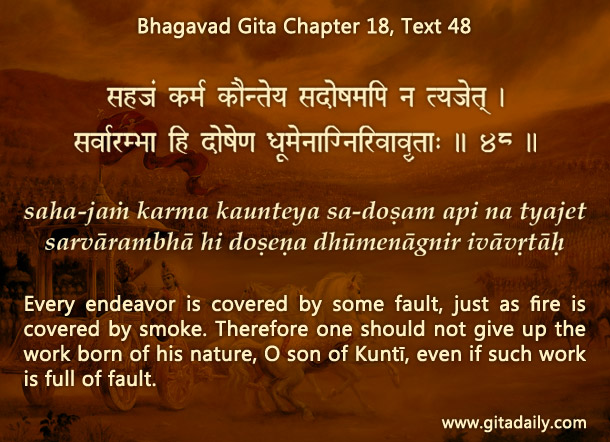Suppose someone is driving a heart attack victim to a hospital. Naturally, they will try to drive as fast as possible. Even if they drive above the speed limit, they may be excused by the traffic police. But if they drive so fast that the car goes out of control and crashes into another vehicle, their attempts to save one life may end up endangering many lives.
This example illustrates the dangers of the ends-justify-the-means argument. Suppose a person is victimized by someone vicious and we want to protect the victim. In trying to save that person or to bring the victim to justice, we may feel justified to overlook some usual ethical codes. During moral emergencies, such suspension is understandable and even acceptable. Pointing to such exigencies, the Bhagavad-gita states that every endeavor is covered by fault.
Still, a caveat is essential. Even if we are well-intentioned and even if we are exempted from some consequences by legal exceptions or even divine interventions, still, we can’t neglect basic human psychology: namely, whatever action we do once, we become more inclined to do it again. That’s why when we take moral shortcuts even if for a good cause, we open for ourselves a door for ethical compromises that had earlier been more or less permanently closed. In the future, we may feel tempted to push open that door even when the situation is not so critical, when opening that door may just be more expedient. And that may begin our descent into a moral downfall. Pertinently, Gita wisdom urges constant vigilance, reminding us that temptation can allure us in many garbs.
One-sentence summary:
The ends may justify the means during emergencies, but beware of the tendency to justify those means for expediency instead of emergency.
Think it over:
- How might well-intentioned moral shortcuts still backfire?
- Have you ever taken any moral shortcuts recently? Were they necessitated by an emergency?
- Are there any moral shortcuts you tend to take for expediency?
***
18.48: Every endeavor is covered by some fault, just as fire is covered by smoke. Therefore one should not give up the work born of his nature, O son of Kuntī, even if such work is full of fault.
To know more about this verse, please click on the image


Success wanes all the sources applied for.
Sometimes.